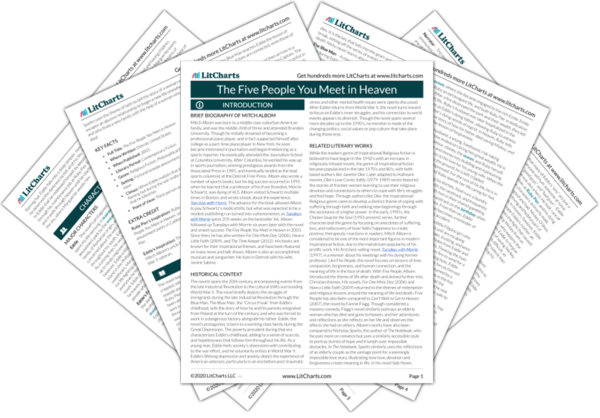Throughout the novel, Eddie’s encounters with the five people he meets in heaven teach him about the surprising ways in which life and death offer opportunities for redemption. He learns about the full extent of his own and others’ transgressions, and consequently moves through anger, regret and forgiveness on his way to finding peace.
The harm Eddie causes others is often unintentional, as his actions are full of unintended consequences. As a child, he unknowingly causes the Blue Man’s death by carelessly running into the street to catch a lost ball. While escaping captivity as a soldier in the Philippines during World War II, Eddie unknowingly kills Tala, a little girl hiding in one of the huts that he and his men have set on fire. Later, Eddie spends his birthday gambling—against his wife’s wishes—and on her way to stop him, Marguerite gets into a severe car accident, which drains their finances and her health. Consequently, Eddie and Marguerite are forced to cancel their plans to adopt a child—destroying Marguerite’s chances of being a mother. In heaven, however, Eddie finds the opportunity to redeem himself for all of his transgressions against others, including those he didn’t know he committed.
Yet the novel also shows that many of Eddie’s “sins” are just a part of being human, as everyone will hurt someone at some point. There aren’t any real “good guys” and “bad guys”—Eddie has caused a lot of pain, yet he was also a hero. He took care of his sick mother and all the children at Ruby Pier, and his dying act was to save a little girl. Other characters, primarily male, also show this capability for both good and bad. Mickey O’Shea, the friend of Eddie’s parents, was a loving and helpful part of Eddie’s life in all of Eddie’s memories. In heaven, however, Eddie learns that Mickey drunkenly tried to rape Eddie’s mother, an act that led Eddie’s father and Mickey into the fight that caused Eddie’s father’s death—while he was saving Mickey from an ocean storm. In heaven, Eddie meets Ruby, who explains the story of Eddie’s father and Mickey. She urges Eddie to forgive Mickey, as well as to see his father’s dying act of saving Mickey as evidence that he was capable of good. This is difficult, as Eddie’s memory of his father is of the callous and violent man who abused him as a child and neglected him during his adulthood.
Redemption can often come indirectly as well, the novel concludes. When Eddie meets Tala in heaven, she explains to him that by spending his life protecting the children on the rides at Ruby Pier, Eddie earned Tala’s forgiveness. Tala shows her forgiveness by choosing to be the person who brings Eddie to heaven. Eddie’s father, on the other hand, never apologizes to Eddie for his abusive, neglectful behavior—yet from Ruby’s perspective, Eddie’s father sought redemption in the end by saving Mickey, as well as calling out for Eddie on his deathbed. Ultimately Albom seems to conclude that sin and suffering are an inevitable part of life and human nature, and therefore the ability to redeem oneself and forgive others is both necessary and vital.
Redemption and Forgiveness ThemeTracker

Redemption and Forgiveness Quotes in The Five People You Meet in Heaven
People think of heaven as a paradise garden, a place where they can float on clouds and laze in rivers and mountains. But scenery without solace is meaningless. This is the greatest gift God can give you: to understand what happened in your life.

Unlock explanations and citation info for this and every other The Five People You Meet in Heaven quote.
Plus so much more...
Get LitCharts A+Adam’s first night on earth? (…) He doesn’t know what sleep is. His eyes are closing and he thinks he’s leaving this world, right? Only he isn’t. He wakes up the next morning and he has a fresh new world to work with. But he has something else, too. He has his yesterday (…) That’s what heaven is. You get to make sense of your yesterdays.
Sacrifice is a part of life. It’s supposed to be. It’s not something to regret. It’s something to aspire to.
Sometimes when you sacrifice something, you’re not really losing it. You’re just passing it on to someone else.
All parents damage their children. It cannot be helped. Youth, like pristine glass, absorbs the prints of its handlers. Some parents smudge, others crack, a few shatter childhoods completely into jagged little pieces, beyond repair.
Eddie privately adored his father, because sons will adore their fathers through even the worst behavior. It is how they learn devotion. Before he can devote himself to God, or a woman, a boy will devote himself to his father, even foolishly, even beyond explanation.
The old darkness has taken a seat alongside him. He is used to it by now, making room for it the way you make room for a commuter on a crowded bus.
Religion? Government? Are we not loyal to such things, sometimes to the death? (…) Better to be loyal to one another.











